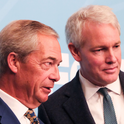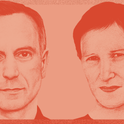One of the big questions when Boris Johnson won his stonking majority was who would really be in charge—would it be Johnson or would we have a Gove-rnment, with the Michael Gove/Dominic Cummings axis holding sway? The second big question was whether these two would be given licence to reshape the way government works—and take aim at the civil service. We are starting to get the answers.
On Saturday, Gove took time out from his passion for football (yes, really, alongside opera) and gave the Ditchley Annual Lecture via Zoom. He set out an intriguing case for reform, channelling FDR. “Inescapably metropolitan” policymakers, led by politicians addicted to the “sugar rush of announcements,” would have to change to bridge the gap between the governors and the governed, he argued. Government by “anywheres” needed to become government by and for “somewheres,” able to relate to the 52 per cent.
His prescription for how to improve government is frankly pretty familiar stuff. A workforce more data literate and less dominated by humanities graduates; delivery valued alongside policy ideas; more rigour in evaluating what the government does and greater ability to draw on evidence; more risk taking and more willingness to fail. Less churn among civil servants and more “deep domain” knowledge.
He also made a strong case for dispersion, spreading civil servants out from London around the country (overlooking—maybe this was one of the experiments that was tried and failed—the fact that one of the first acts of the Cameron government was to abolish the government’s regional office network). That would mean policy would be made closer to the communities affected, and also give new opportunities to people to join the ranks of policymakers. Decentralisation of power from London seems to have gone on the backburner since the far distant days of George Osborne.
This prescription is striking mainly for its familiarity. Very few civil servants would not say that most of these are quite good ideas. Indeed they could point to a range of initiatives, some working, some forgotten, that were all designed to do this. None of that means it is not worth trying. Again.
Some meanwhile might blink at Gove’s new-found discovery of evidence. Isn’t this after all the same Gove who was sick of experts? To be fair, what he really was sick of was economic forecasters—and he is right that they did not cover themselves in glory in the run-up to the financial crisis. He was also the instigator of one of the best innovations of the Cameron government: the Education Endowment Foundation, which has led the way in conducting high-quality experiments on how schools can tackle disadvantage. But is he really opening up some of the big decisions of this government to critical ex-post evaluation?
But so far, so polite and so mainstream—though for a speech that denounced announcements that prove difficult to deliver, it was notably short of any concrete measures that might actually convince that the government was going to follow through. That was Saturday.
By Sunday the second half of the reform agenda began to emerge. Not how the reforms would be delivered, but by whom. The first answer was “not Mark Sedwill.” Just days after Simon McDonald had been asked to step down from his role in the Foreign Office to allow someone else to oversee the merger with DfID, the cabinet secretary announced that he had agreed with the PM he would leave his job at the end of September. That this was hardly a voluntary departure was clear from the months of anti-Sedwill briefing from sources close to No 10 and the Cabinet Office that had repeatedly surfaced as the Covid crisis deepened. There were reports that Sedwill was very unhappy at the arrival of Simon Case as permanent secretary at No 10, drafted in to get a grip there. They join former Home Office permanent secretary Philip Rutnam, currently suing the home secretary for unfair dismissal.
The big question is what happens next—or more accurately, who happens next. We already know part of the answer. Before there is even any ink to dry on a Brexit deal, chief negotiator, and the second most important special adviser in government, David Frost, will take over as national security adviser at the end of August, though will continue to lead on the EU negotiations which the government hopes to wrap up soon afterwards. This seems to be a differently conceived role—as a champion of global Britain. But Frost’s lack of securo-credentials, despite an FCO career, is striking. As is giving that job in its current form to a political appointee, and putting him in the Lords but not making him a minister. Is this (another) Frost exception, or the way the government sees top appointments going in the future?
Who will succeed Sedwill? Rutnam was swiftly replaced by a serving permanent secretary. The government is reported as saying that the competition (something Sedwill himself did not have to go through for either of his posts) will be confined to past and present permanent secretaries, in what is being reported as a deal with the Civil Service Commission, which is supposed to maintain the impartiality of the civil service. There is, though, simultaneous briefing that the PM wants a top mandarin with belief in the Brexit cause—a question that is absolutely off limits in any civil service interview.
This is a space well worth watching by for anyone interested in how we are governed.
A big weekend for the civil service
Is the way we are governed about to change?
June 29, 2020

photo: WIktor Szymanowicz/NurPhoto/PA Images











